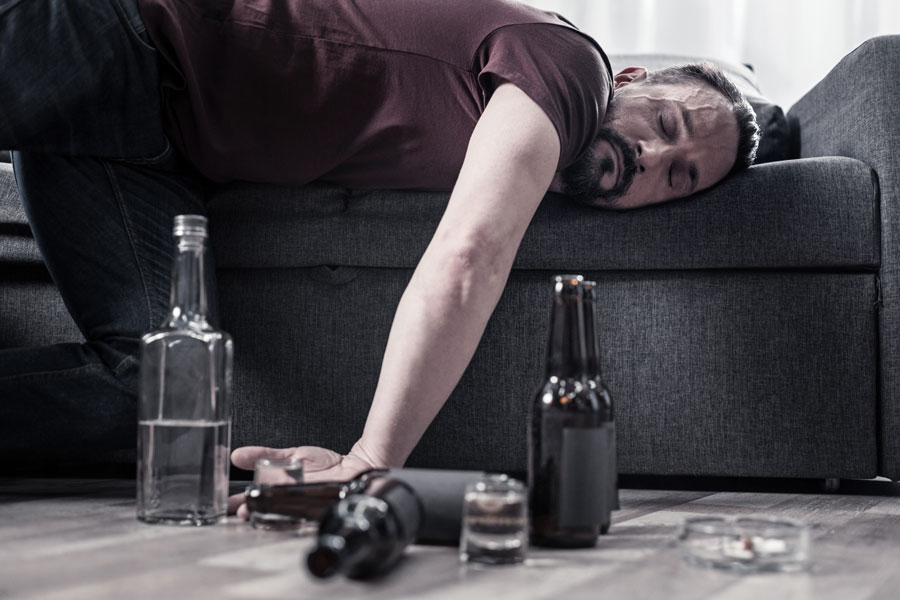Is a Nightly Drink Alcoholism?
Alcohol use disorder comes in many shapes and sizes. When most people picture alcohol use disorders, the stereotypical profile probably manifests in their mind’s eye: An unkempt, 40 or 50-something that slurs their words, in a state of constant over-emotion. If it’s a male, he probably has a perpetual five o’clock shadow and wreaks of cheap liquor.
While this person certainly exists, and some of us may have met them, the assumption that every alcoholic comes packaged this way is far from the truth. Alcohol use disorder looks like your neighbors, friends, family, and doctor – the possibilities are endless.
The problem with stereotypes like the one mentioned above is that alcohol has no target demographic, and these types of assumptions can make it hard to identify individuals who really need help. In many cases, individuals dealing with alcohol use disorder have no idea that they fit the National Institute on Alcohol Abuse and Alcoholism (NIAAA) criteria for potentially being an alcoholic.
In fact, individuals suffering from alcohol use disorder don’t even have to frequently reach the point of intoxication or being drunk to earn this diagnosis. What does it take to meet the criteria for alcohol use disorder?
Does Daily Drinking Equal Alcoholism?

“I drink every night. Am I an alcoholic?” If you or someone you know has asked this question in regard to drinking habits, it might be time to assess where you stand.
How exactly does one reach the answer to this question? Is there a technical answer or a more specific classification for these types of drinkers?
One of the easiest ways to gauge where you stand when it comes to alcohol use disorder is by using the stages of alcoholism. Comparing your situation to the stages of alcoholism can give you a clear picture of where you stand and what your next course of action should be.
I Drink a Lot Every Weekend. Am I an Alcoholic?
Plenty of working-class Americans arrives home after the workweek to a waiting alcoholic beverage of their choice. It’s not uncommon for many of them to have a single drink and abstain from a second or third. However, the repeated usage of large amounts of alcohol each weekend may be a sign of an alcohol use disorder.
During the workweek though, does a daily pattern of just one drink per day equate to alcohol use disorder? Let’s take a look at the numbers according to the NIAAA.
Drinking In Moderation
Drinking in moderation is considered the consumption of two drinks or less in one single day for men or one drink or less for women. However, there is no clear specification regarding consecutive days under this classification. Let’s see what else the NIAAA has to say.
Binge Drinking

Binge drinking is a pattern of drinking that regularly brings the BAC to 0.08 – the legal limit in most state’s for DUI. In the average male, this is about five drinks in a period of two hours. Notice that this states a pattern of regularity but still doesn’t specify a certain number of days.
Heavy Alcohol Use
Heavy alcohol use in men is the consumption of four drinks in one day or the regular consumption of 14 drinks in one week. For women, the consumption of seven drinks in one week is considered heavy alcohol use. SAMHSA considers heavy alcohol use as binge drinking on five or more days during the month.
The NIAAA literature goes on to say that patterns associated with alcohol use disorder include regular patterns of binge drinking and heavy alcohol use. After reading the characteristics outlined by the NIAAA, it’s much easier to answer individuals who ask, “I drink every night. Am I an alcoholic?”
Based on the characteristics outlined above, if an adult male limits his intake to one single drink per day, he isn’t considered an alcoholic. However, two drinks per day, which would equal 14 per week, would land him in alcohol use disorder territory.
However, because alcohol use disorder is often progressive, it would be unwise to assume that someone regularly consuming one drink per day wasn’t dangerously bordering alcoholism.
One of the most commonly repeated themes among individuals who consume alcohol is the affirmation that their drinking is under control or moderated. Because individuals can technically drink every day and not be considered alcoholics, are there any specific steps to further assist in an act already considered “moderate drinking?”
Can You Moderate Regular Drinking?
It’s strongly recommended that anyone engaging in moderate drinking doesn’t participate in binge drinking or heavy drinking. When this happens, the line between moderate drinking and alcohol abuse disorder starts to blur.
If you know someone that is considered a moderate drinker, it may be critical to remain vigilant of the signs of alcohol use disorder. The following section outlines things to look out for.
What Are the Signs of Alcohol Use Disorder?

Although everyone handles alcohol use disorder individually and displays different symptoms, certain behaviors may be more noticeable. The following list contains some of the more common characteristics displayed by individuals with alcohol use disorder.
- Increasingly negative consequences resulting from drinking. Some of these may be family-related, while some may be more severe and include legal issues.
- Drinking to the point of not remembering the events of the night or days before
- Attempting to cover up or lie about the amount of alcohol they consume
- Feeling the constant need for a drink before going out or engaging in a social activity
- Hiding their drinking altogether
- Drinking more than intended or more than other people present for an event or special occasion
- Using drinking as a stress-reliever or response to negative events
- Putting drinking before important family events
- Verbalizing a want to stop drinking but never going through with these commitments
While these can all be significant red flags alerting you to the presence of alcohol use disorder, a formal examination can provide a more accurate diagnosis. There are currently five measures that officially determine alcohol dependency.
Methods to Determine Alcohol Dependency
The following five measures are all accepted methods for determining the presence of alcohol dependency.
Alcohol Timeline Followback
This method requires a detailed picture of an individual’s daily drinking habits over a specific time period. Individuals may be required to provide details regarding the prior year.
Form 90
Form 90 is a more specific type of measurement to determine specific changes before and after a 90-day abstinence period. This is typically used as a post-treatment form of measurement.
Drinking Self-Monitoring Log
This measurement requires more detailed information regarding the frequency of an individual’s drinking habits.
Lifetime Drinking Measures
This requires an individual to provide a rough estimate of their habits over the course of their life or any period longer than a year.
Quantity-Frequency Measures
This requires information regarding the individual’s amount of alcohol used and the frequency or regularity of this consumption.
The importance of determining the presence of alcohol dependency is critical to mitigate the risks associated with drinking daily. Keep in mind that these risks are both physical and mental in nature.
Effects and Risks of Daily Drinking
Daily drinking is a habit that can take place on a moderate or severe level. Obviously, someone who drinks daily in high amounts has greater odds of negative consequences than someone who drinks in moderation.
In the past, health professionals believed that moderate levels of drinking posed little to no health risks. In fact, many sources stated that smaller amounts of daily drinking could actually have a positive impact on your health.
However, more recent studies show that, in reality, there is no safe level of drinking. Even moderate amounts can have a negative impact on the way the brain functions.
There are short-term and long-term risks for individuals who actively engage in daily drinking. Even in small amounts, the short-term risks can produce potentially life-changing consequences.

Short-term Risks
Short-term risks of daily drinking are less associated with acute health issues and more closely related to the negative consequences of challenging behavior. Immediate physical health risks normally don’t become a factor until users frequently engage in binge drinking.
Moderate daily drinking may put users at risk for the following:
- Accidents related to intoxication, especially since users consume small amounts and don’t believe they are impaired in any way
- Injuries that take place as a result of slower reaction times
- Engaging in dangerous or impulsive behavior because of impaired judgment
- The potential for legal issues associated with poor decision-making
When someone consumes alcohol in small amounts, they may feel like they’re not impaired, which promotes a false sense of security. This momentarily lapse of critical thinking is what leads to the increased risk of the situations mentioned above.
After significant amounts of time spent consistently engaging in daily alcohol consumption, more serious effects may begin to surface.
Long-term Risks
The long-term risks and effects of alcohol can take a toll on the mind and body of individuals with alcohol use disorder.
Mental effects include:
- Changes in mood
- Insomnia
- Decreased sex drive
- Problems with memory and concentration
- Negative impact on relationships
The physical effects can be even more challenging and can even be deadly in the worst cases. Potential risks include:
- Conditions associated with inflammation of the pancreas
- Long-term liver damage
- Decreased pancreatic functions lead to higher sugar levels that may cause diabetes
- Numbness in hands and feet
- Damage to the digestive system
- High blood pressure and irregular heartbeat
The risk of developing any of the symptoms side effects mentioned above should be enough to trigger the motivation to stop drinking every day. However, individuals with substance abuse disorder may find it difficult to see the light at the end of the tunnel.
How Can I Stop Drinking Every Day?
 It’s possible to create a plan for recovery and successfully refrain from drinking every day. However, once the situation reaches the level of developing mental and physical symptoms that are directly caused by alcohol use disorder, the goal should be to stop drinking completely.
It’s possible to create a plan for recovery and successfully refrain from drinking every day. However, once the situation reaches the level of developing mental and physical symptoms that are directly caused by alcohol use disorder, the goal should be to stop drinking completely.
Consider the following steps as a pathway to recovery:
- Look into the benefits of residential rehab. If you feel like you need professional help to overcome alcohol use disorder, you’re probably a good candidate for inpatient treatment.
- Don’t stop when treatment is over. Continue to remain proactive in battling substance use disorder by attending 12-step recovery groups and maintaining a strong support system.
- Alternatively, if you’ve been ordered to attend any type of court-ordered treatment, use this as a stepping stone to recovery. Sometimes your greatest challenges are actually blessings in disguise.
Alcohol use disorder doesn’t just disappear after treatment or a certain period of recovery. However, if you actively seek out ways to strengthen your support systems and maintain high levels of willpower, the daily struggle against alcohol use disorder gets easier with time.
At Best Rehabs In Arizona, we’ve helped clients navigate their recovery from alcohol use disorders of all kinds and severities. From detox services to inpatient treatment with multiple approaches to therapy, you’ll have access to different treatment levels that we believe can be very successful in promoting long-term recovery.
Contact an Admissions team member to find out more about how we can help provide you with the tools you need to take your life back.







